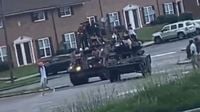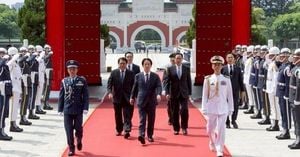Memphis, Tennessee, finds itself at the heart of a national debate after President Donald Trump directed the deployment of the state’s National Guard to the city in mid-September 2025. The move, announced through a memorandum signed on September 15, has drawn sharp criticism from local leaders, civil rights organizations, and political figures across the country, even as the federal government presses forward with what it calls an aggressive response to a purported crime emergency.
President Trump’s directive, as reported by the Associated Press and echoed in multiple outlets, called for National Guard troops to be sent to Memphis and established a federal task force to combat what he described as a city “overrun” with robberies, carjackings, and shootings. Trump, speaking on Fox & Friends, promised to replicate the controversial Washington, D.C., crackdown, which included a heavy federal and National Guard presence. “We’re going to Memphis,” Trump declared. “Memphis is deeply troubled… We’re going to fix that just like we did Washington.” According to BBC, he credited the D.C. operation with bringing “virtually no crime” to the capital and warned that Chicago and St. Louis could be next on his list.
Yet, the deployment has not been welcomed by city leaders. Memphis Mayor Paul Young made it clear in a post on X (formerly Twitter) that he had not requested the National Guard and questioned whether troops were the right solution for the city’s crime challenges. “Yesterday morning, we learned that the Governor & President have decided to place the National Guard & other resources in Memphis, which they have the authority to do,” Young wrote. “I want to be clear: I did not ask for the National Guard and I don’t think it is the way to drive down crime.” In a subsequent message, the mayor acknowledged that the decision was final but committed to managing the federal presence “strategically to ensure this happens in a way that truly benefits and strengthens our community.” Speaking to CNN, Young reiterated his dismay, stating he was “not happy” with the decision but would work to ensure the deployment’s impact was limited and strategic.
Mayor Lee Harris, who leads the county that includes Memphis, echoed these concerns. During a press conference, Harris advocated for federal law enforcement support but drew a clear line against military occupation of city streets. “I’m fearful that where this is going and that we will not get the promise of zero crime,” Harris said, warning that the tradeoffs of such drastic federal action could erode community trust and civil liberties, as seen in Washington, D.C.
The Legal Defense Fund (LDF), the nation’s first civil rights law organization, issued a scathing statement condemning the deployment. Jin Hee Lee, LDF’s Director of Strategic Initiatives, called the move “a brazen abuse of power and a chilling continuation of an authoritarian strategy, bent on imperiling the public safety of yet another city led by a Black mayor with a substantial population of Black residents.” Lee added, “History has shown that aggressive law enforcement strategies, like saturating neighborhoods with officers or employing militarized tactics and resources, do not improve public safety, but instead create an atmosphere of fear—especially among Black residents.” The LDF’s statement underscored the group’s longstanding opposition to the use of military resources for domestic policing, especially in communities of color.
Notably, the Memphis Police Department had recently announced that crime in the city was at a 25-year low—a fact cited by critics who argue that the federal deployment is both unnecessary and politically motivated. The LDF, in its statement, accused President Trump of misleading the public with “inaccurate claims of a purported crime emergency to justify the irresponsible use of federal resources.”
The controversy comes on the heels of Trump’s similar actions in Washington, D.C., where a 30-day emergency order brought an influx of federal law enforcement and National Guard members to the capital. Data analyzed by the Associated Press revealed that over 2,300 arrests were made during the D.C. operation, with more than 40 percent involving immigration offenses. Despite Trump’s assertions that the crackdown was a success, critics point out that over 70 percent of immigrant detainees had no criminal conviction and that the operation’s visible militarization led to decreased tourism and public trust. The longer-term impact, some argue, may be a lasting erosion of civil liberties and community-police relations.
Political backlash to the Memphis deployment has been swift and bipartisan. California Governor Gavin Newsom criticized Trump for using troops as “political pawns,” while Senator Tammy Duckworth, a retired Army National Guard lieutenant colonel, and Chicago Mayor Brandon Johnson both denounced the move as unconstitutional. Johnson accused Trump of wanting to “occupy our city and break our Constitution,” referencing speculation that Chicago could have been the next target of the administration’s “Operation Midway Blitz.” Trump himself admitted he “would have preferred” to target Chicago but ultimately chose Memphis.
As the deployment unfolded, misinformation quickly spread online. In September 2025, rumors circulated that residents of Memphis were riding stolen National Guard tanks through city streets. Snopes investigated and debunked the claim, tracing the viral video to a 2020 music video shoot in Atlanta, Georgia, where British tanks had been rented as props. A National Guard Bureau spokesperson confirmed to Snopes that “there are no tanks deployed into the streets in Memphis. Furthermore, NGB also confirms no one stole two tanks in Memphis, or elsewhere for that matter.” The Memphis Police Department was also contacted to confirm the falsehood of the rumor. This episode highlighted the challenges of separating fact from fiction in a heated political climate, especially as high-profile federal actions draw intense public scrutiny.
Meanwhile, the city’s leadership is left to navigate the realities of an imposed federal presence. Mayor Young, while clear in his opposition, has pledged to work with state and federal officials to ensure that any intervention “truly benefits and strengthens our community.” The mayor’s pragmatic stance reflects a broader concern: that the city’s efforts to address crime and build trust could be undermined by heavy-handed, externally driven tactics.
As the situation develops, Memphis stands as a microcosm of the national debate over federal intervention in local policing. The deployment has reignited questions about the appropriate use of military resources, the balance between security and civil liberties, and the role of political motivations in law enforcement decisions. For many Memphians, the coming weeks will be a test not just of public safety strategies, but of the city’s resilience and its leaders’ ability to protect both security and freedom in challenging times.





